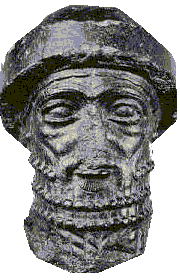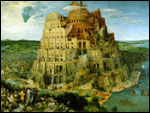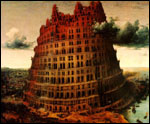


At The Bottom: Captions for pictures, recourseful links, and more.

Mesopotamia, a land of opportunity. Or so it was to the ancient world. These pioneers of early civilization were attempting a new and revolutionary way of life. They were uniting people in order to promote prosperity and make advancements in their everyday lives.
For any group of people to start a civilization, six aspects are required. These attributes are a system of laws, government, specialization of labor, system of writing, trade, and taxation. A civilization could not prosper if any one of these necessities were missing. In fact, many cultures have fallen due to the loss of one or more of these pillars of civilization. Out of all the civilizations that did prosper in Mesopotamia, one in particular stands out by excelling in the six attributes. This civilization was the land of Babylon.
SYSTEM OF LAWS
Babylon was strong in all of the required aspects of civilization. However, Babylon's greatest attribute was in it's system of laws which all else revolved around. The creation of the first uniform code of laws is what gave Babylon this strength and made them superior to the surrounding civilizations. This list of laws is referred to as Hammurabi's Code, named after the king who perceived the importance of laws which applied equally to all people of Babylon.  He wrote 282 laws in total. His purpose for the code was "to cause justice to prevail in the land, to destroy the wicked and the evil, to prevent the strong from oppressing the weak, and to further the welfare of the people. (Beers)"
He wrote 282 laws in total. His purpose for the code was "to cause justice to prevail in the land, to destroy the wicked and the evil, to prevent the strong from oppressing the weak, and to further the welfare of the people. (Beers)"
Hammurabi's Code touched on every crime imaginable from theft, to murder, to adultery and abuse. Despite the variety of possible crimes, the punishment was always determined the same way. This is where the statement, "an eye for an eye, tooth for a tooth" is derived from. If a man killed another man, he was sentenced to death. If a carpenter built a house that collapsed killing the son of the owner, the carpenters son was executed. This method of specifying a consequence applied to all crimes. However, punishments did vary in some cases. The severity of the consequence was affected by the class of the victim and criminal. When the two parties are of the same class, the punishment becomes more harsh as the class level elevates. However, if someone of lower class violates an upper class citizen, the reprimanding was even more severe than before. Not all civilizations had laws which applied to all classes. The Pharaohs of Egypt, for example, had absolute power over everyone. These rulers could decide a punishment for anything at anytime leading to serious abuse of power. In Babylon, the people knew what the laws were and knew the consequences for their actions. There were no suprises and significantly more justice in Hammurabi's Code.

SPECIALIZATION OF LABOR
Specialization of labor was another strength in ancient Babylon. Among the different types of specialization there were builders, barbers, carpenters, and scribes. In every specialty, you were rewarded for obtaining additional skill. According to Hammurabi's Code, the more skilled the labor, the higher the payment to and lifestyle of the laborer was to be assured. In contrast, there were drawbacks to poor workmanship. Barbers in Babylon were similar to those of today. Their work however carried an added risk. Slaves had specific hair styles as a way of identification. If a barber shaved or altered the style without the permission of the owner, the barber was severely punished. Carpenters in Babylon also faced additional risk. Like today, they built houses and overlooked the building process. However, if their houses collapsed or were faulty and someone was injured, they would be severely punished.  Unlike modern times, they would not merely lose their financial assets, they were likely suffer physical punishment or death. These risks kept the work of the Babylonians at a high level of quality and strengthened the civilization itself by creating a skilled workforce. All the people who contributed in their specific area helped to make Babylon an advanced and strong civilization. Without the specialization and increased skill of the labor force, the people would not advance and the civilization would have become weak.
Unlike modern times, they would not merely lose their financial assets, they were likely suffer physical punishment or death. These risks kept the work of the Babylonians at a high level of quality and strengthened the civilization itself by creating a skilled workforce. All the people who contributed in their specific area helped to make Babylon an advanced and strong civilization. Without the specialization and increased skill of the labor force, the people would not advance and the civilization would have become weak.
GOVERNMENT
Babylon also had a strong system of government that was led by great kings such as Hammurabi. This man provided Babylon with a strong central government that was fair to all citizens and easily controlled. This form of government was so effective that the Romans later ruled with the same form of centralized government. In Babylon all the economy was controlled by the government, thus no private businesses were owned. To keep control of the economy Hammurabi placed his priests, whom had to obey him, in charge. Also when necessary, civil magistrates were presented with the authority. In addition, Hammurabi improved the roads of his empire which led to two positive results. One was that it was easier for the citizens of Babylon to travel and trade. The other was that it made it easier for Hammurabi's troops to enforce the laws. Sumerians had a city-state government which was not as efficient. The various city-states were not in union with each other and often were at war. This demonstrates that the government of Babylon was much more efficient and effective.
SYSTEM OF WRITING
The system of writing they used was another strong attribute of the Babylonian civilization. Only a small percentage of the population were scribes in Babylon and they were the only citizens who could read and write. Originally, everything (including the Code of Hammurabi), was written by scribes in cuneiform. At the time, cureiform was an advanced yet complicated form of writing that was associated with the spoken language of Akkadian. Cuneiform was particularily advanced when compared to Egyptian hieroglyphics which were extremely difficult to decipher. Depending on the interpreter, the pictograms used were often translated differently, changing the meaning of the writing. However, as time progressed, Babylon adopted the Aramaic language from civilizations outside of Mesopotamia. Along with this new flexile langguage which was understood by many cultures, came the introduction of alphabetic script used symbols to represent different sounds that could be combined to form words.
TRADE AND TAXATION
Trade and taxation are other aspects that Babylon's civilization mastered. Hammurabi's code insured satisfaction with traders, especially the buyers. There were two types of people while trading in Babylon, buyers and sellers. Buyers purchase the goods and were the ones who decided on the price. Sellers brought the merchandise in hopes someone would be willing to trade something the seller needed for the goods. What protected both parties was that responsibility was required according to the law. If either party did not meet the terms of an agreement, the government could be called on to settle the dispute. For those who did not make an income in trade, taxation provided them with an income. For example, people helping to build ziggurats were paid with necessities such as grain, barley, wool, wood, horses, live stock, and at times, silver. All of this was collected through taxation. The man in charge of collecting the taxes was the Grand Vizier, who was the most important of the official dignitaries. Babylon was superior to Egypt in both trading and taxation. In trading, Egypt remained isolated for centuries due to their land form boundaries. Babylon worked to increase their ability to transport goods and thereby improved their trade economy. Also, taxation in Egypt was extremely high. This was to support the Pharoah's enormous building projects. Babylon was more frugal and while they demanded less in taxes they also used the assets to support their own citizens, using it to pay thos who worked on government projects as well as the officials in charge.
 In conclusion, the strong civilization of Babylon was far more advanced than any other durring its time. Babylon used advanced ways in its specialization of labor by providing them with a guaranteed system of reward for increased skill. It also possesed an exteamly organized government with the use of Hammurabi's Code. Other aspects that Babylon enjoyed were superior trade and an efficient system of writing. Egypt and other civilizations of this era did not make such large advancements, only small progressions. Hieroglyphics were used thoughout Egyptian history. However, this form of writting was often misinterpreted. The governmentof Egypt was ruled by Pharaohs with absolute power. This extream power however, could be greatly abused, leeding torward devestation for the community. It is due to civilizations in history such as Babylon, that our culture is as advanced as it is today. If it were not for all of these pioneers of civilization, our every-day life would have been drasticly alterred.
In conclusion, the strong civilization of Babylon was far more advanced than any other durring its time. Babylon used advanced ways in its specialization of labor by providing them with a guaranteed system of reward for increased skill. It also possesed an exteamly organized government with the use of Hammurabi's Code. Other aspects that Babylon enjoyed were superior trade and an efficient system of writing. Egypt and other civilizations of this era did not make such large advancements, only small progressions. Hieroglyphics were used thoughout Egyptian history. However, this form of writting was often misinterpreted. The governmentof Egypt was ruled by Pharaohs with absolute power. This extream power however, could be greatly abused, leeding torward devestation for the community. It is due to civilizations in history such as Babylon, that our culture is as advanced as it is today. If it were not for all of these pioneers of civilization, our every-day life would have been drasticly alterred.
Essay and Webpage by Christina D and Katie M
Recourseful Links About Babylonia:
Babylonia 580 B.C. | Ancient Sites.com: Babylon |
The Hanging Gardens of Babylon | Babylonian and Egyptian Mathematics
Works Cited List
Captions: The first picture shows the famous hanging gardens of Babylon. The second picture shows a staue of Hammurabi who created the Code of Laws for the civilzation of Babylon. The third and fourth picture show a drawing of the famous Tower of Babel which Babylon also became famous for. The fifth picture is a drawn interpretation of what Babylon might have looked like.

This page was created by Christina and Katie for Ancient and Medieval Studies. Go to the rest of our pages to see more: Christina's Ancient and Medieval Page | Katie's Work Page
You Are Listening To Arabian Nights From The Disney Music Page!







 He wrote 282 laws in total. His purpose for the code was "to cause justice to prevail in the land, to destroy the wicked and the evil, to prevent the strong from oppressing the weak, and to further the welfare of the people. (Beers)"
He wrote 282 laws in total. His purpose for the code was "to cause justice to prevail in the land, to destroy the wicked and the evil, to prevent the strong from oppressing the weak, and to further the welfare of the people. (Beers)"

 Unlike modern times, they would not merely lose their financial assets, they were likely suffer physical punishment or death. These risks kept the work of the Babylonians at a high level of quality and strengthened the civilization itself by creating a skilled workforce. All the people who contributed in their specific area helped to make Babylon an advanced and strong civilization. Without the specialization and increased skill of the labor force, the people would not advance and the civilization would have become weak.
Unlike modern times, they would not merely lose their financial assets, they were likely suffer physical punishment or death. These risks kept the work of the Babylonians at a high level of quality and strengthened the civilization itself by creating a skilled workforce. All the people who contributed in their specific area helped to make Babylon an advanced and strong civilization. Without the specialization and increased skill of the labor force, the people would not advance and the civilization would have become weak.
 In conclusion, the strong civilization of Babylon was far more advanced than any other durring its time. Babylon used advanced ways in its specialization of labor by providing them with a guaranteed system of reward for increased skill. It also possesed an exteamly organized government with the use of Hammurabi's Code. Other aspects that Babylon enjoyed were superior trade and an efficient system of writing. Egypt and other civilizations of this era did not make such large advancements, only small progressions. Hieroglyphics were used thoughout Egyptian history. However, this form of writting was often misinterpreted. The governmentof Egypt was ruled by Pharaohs with absolute power. This extream power however, could be greatly abused, leeding torward devestation for the community. It is due to civilizations in history such as Babylon, that our culture is as advanced as it is today. If it were not for all of these pioneers of civilization, our every-day life would have been drasticly alterred.
In conclusion, the strong civilization of Babylon was far more advanced than any other durring its time. Babylon used advanced ways in its specialization of labor by providing them with a guaranteed system of reward for increased skill. It also possesed an exteamly organized government with the use of Hammurabi's Code. Other aspects that Babylon enjoyed were superior trade and an efficient system of writing. Egypt and other civilizations of this era did not make such large advancements, only small progressions. Hieroglyphics were used thoughout Egyptian history. However, this form of writting was often misinterpreted. The governmentof Egypt was ruled by Pharaohs with absolute power. This extream power however, could be greatly abused, leeding torward devestation for the community. It is due to civilizations in history such as Babylon, that our culture is as advanced as it is today. If it were not for all of these pioneers of civilization, our every-day life would have been drasticly alterred.
